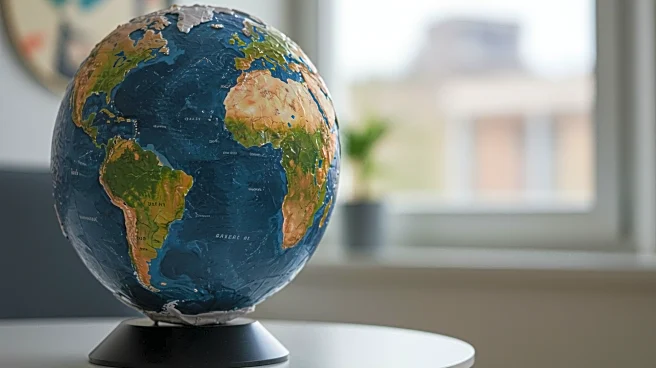What's Happening?
The latest round of United Nations negotiations in Geneva aimed at finalizing a global treaty to address plastic pollution ended without an agreement. The talks, which began in 2022, have been hindered by disagreements over whether to impose limits on plastic production or focus on recycling and reuse. Approximately 100 nations, including those in Africa, Latin America, and the European Union, advocated for significant production cuts and the regulation of toxic chemicals. However, major plastic-producing countries, including the United States, Russia, Iran, and Saudi Arabia, resisted binding limits, favoring waste management solutions instead. The negotiations revealed entrenched interests from oil-producing states and major plastic manufacturers, which continue to shape global efforts to curb plastic pollution.
Why It's Important?
The failure to reach an agreement highlights the ongoing challenges in global environmental diplomacy, particularly the clash between countries advocating for production cuts and those defending fossil fuel-linked industries. Plastic pollution has severe impacts on ecosystems, climate, and human health, with microplastics found in human blood and vital organs. The strong presence of fossil fuel and chemical industry lobbyists at the negotiations underscores the influence of these sectors in shaping policy. The absence of binding limits on plastic production raises concerns about the ability to effectively address one of the world's most pressing environmental crises. The outcome of these talks could significantly impact global efforts to reduce plastic pollution and protect the environment.
What's Next?
The path forward for curbing plastic pollution remains uncertain, with negotiations expected to continue at a future date. Some countries, including Germany and its EU partners, have expressed a commitment to building bridges and pushing for further negotiations. However, the absence of political heavyweights at the talks has fueled doubts about the commitment of some countries to reach an agreement. Observers stress the need for cooperation across divergent national and industrial interests to resolve the crisis. The Business Coalition for a Global Plastic Treaty and the Ellen MacArthur Foundation have urged governments to strive for harmonized regulations across the full lifecycle of plastics.
Beyond the Headlines
The entrenched interests of fossil fuel and chemical industries in the negotiations highlight the broader economic implications of plastic production. Plastics, derived from fossil fuels, contribute to greenhouse gas emissions at every stage, from production to disposal. Meeting climate goals would require significant reductions in plastic production, yet only a small percentage of plastic is recycled. The negotiations also exposed underlying fault lines over how to handle the plastic pollution crisis, with debates over whether to focus on waste management or production limits. The strong presence of industry lobbyists raises ethical concerns about the influence of corporate interests in shaping environmental policy.









